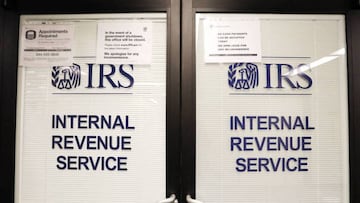What time is the deadline on 17 May for tax filing 2021?
Make sure to get your tax returns filed promptly to avoid being hit with financial penalties from the IRS. If not, make sure to request an extension from the tax authority.


The deadline for submitting your IRS tax returns is drawing near and you have just one day left to complete your filing and avoid being hit with financial penalties.
After pushing back the original date, the new deadline is Monday 17 May 2021. The IRS website makes clear that anyone who needs “additional time to file beyond the May 17 deadline” will have to file for an extension.
This means that you need to get your filing completed before midnight on the eve of the 18 May. However bear in mind that the e-filing online portal will likely be experiencing high levels of traffic as the deadline draws near so you should avoid leaving it to the last minute.
Read more
- IRS will start sending tax refunds for the $10,200 unemployment tax break
- Fourteen states will end additional unemployment benefits in June
IRS can issue fines for late tax returns
The deadline has already been extended once to allow filers to reconcile the various forms of financial relief distributed during the course of the pandemic. However failure to meet the new deadline will see you face financial penalties for any of the following:
- Failing to file your tax returns on time, assuming that an extension has not been granted
- Failing to pay any outstanding tax payments before the deadline (extensions do not necessarily exempt you from tax payment fines)
- Failing to make an estimated tax payment on time for those who are required to provide them
The deadline for filing an #IRS income tax return and making a payment is May 17. Taxpayers who need more time to file can request an extension until Oct. 15, 2021. https://t.co/aO7gmxudbN pic.twitter.com/JRRuvSsy3i
— IRSnews (@IRSnews) May 15, 2021
Also note that these penalties will accrue interest if not paid promptly. For more information on the IRS tax return penalties, check out our handy guide to tax return penalties.
How to apply for a tax return extension
The process to apply for a tax return extension is fairly straight-forward and, if approved, will give you until 15 October 2021 to file your 2020 returns.
The IRS advise that to apply for the extension you simply need to submit “Form 4868 through their tax professional, tax software or using the Free File link on IRS.gov.”
The deadline to file taxes is this upcoming Monday — but you can still file for an extension. Here’s how pic.twitter.com/WTffyPFpnH
— CBS News (@CBSNews) May 15, 2021
Related stories
However it should be noted that this extension will only exempt you from penalties for failing to file your tax return on time. If you have an outstanding tax balance that you need to pay, you will still be subject to a fine if it is not paid before the 17 May deadline.
Missing the deadline may also have a knock-on effect when it comes to potential stimulus check payments and the new-look Child Tax Credit when it is introduced in July. Both programmes are administrated by the IRS and they rely on tax return information to judge eligibility. As such, any payments you are owed may be delayed until after your 2020 returns have been processed.

